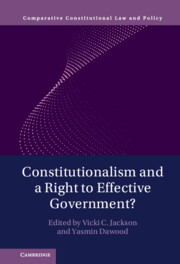Book contents
- Constitutionalism and a Right to Effective Government?
- Comparative Constitutional Law and Policy
- Constitutionalism and a Right to Effective Government?
- Copyright page
- Dedication
- Contents
- Tables
- Contributors
- Acknowledgments
- Part I Introduction
- Part II What Are Constitutions For?
- Part III Positive Rights and Rights to Effective Self-Government
- 6 Post-Liberal Constitutionalism and the Right to Effective Government
- 7 Does the First Amendment Forbid, Permit, or Require Government Support of News Industries?
- 8 The “Right to Effective Governance” and the Human Rights Baseline
- Part IV The Role of Courts in Building State Capacity and Promoting Effective Self-Government While Protecting Rights
- Part V Executive and Administrative Constitutionalism in Effective Democratic Government
- Part VI Legislatures, Representation, and Duties of Effective Self-Government
- Part VII Politics, Sociology, Media, and Corruption as Contexts for Constitutionalism and Governance
- Index
6 - Post-Liberal Constitutionalism and the Right to Effective Government
from Part III - Positive Rights and Rights to Effective Self-Government
Published online by Cambridge University Press: 20 October 2022
- Constitutionalism and a Right to Effective Government?
- Comparative Constitutional Law and Policy
- Constitutionalism and a Right to Effective Government?
- Copyright page
- Dedication
- Contents
- Tables
- Contributors
- Acknowledgments
- Part I Introduction
- Part II What Are Constitutions For?
- Part III Positive Rights and Rights to Effective Self-Government
- 6 Post-Liberal Constitutionalism and the Right to Effective Government
- 7 Does the First Amendment Forbid, Permit, or Require Government Support of News Industries?
- 8 The “Right to Effective Governance” and the Human Rights Baseline
- Part IV The Role of Courts in Building State Capacity and Promoting Effective Self-Government While Protecting Rights
- Part V Executive and Administrative Constitutionalism in Effective Democratic Government
- Part VI Legislatures, Representation, and Duties of Effective Self-Government
- Part VII Politics, Sociology, Media, and Corruption as Contexts for Constitutionalism and Governance
- Index
Summary
Notwithstanding the efforts that have been made to pluralize the concept, constitutionalism continues to be identified closely with, and for many remains synonymous with, classical liberal thought.1 The eighteenth-century notion that constitutionalism is mainly about restraining the Leviathan refuses to die. The continuing strength of the association between constitutionalism and this particular strain of liberalism does not preclude movement to a post-liberal (or post-neoliberal) understanding of constitutionalism. It does suggest, however, that post-liberal constitutionalism is more likely to stick if it assumes at least some of the trappings of old-school liberal constitutionalism. The best way to transform the language of liberal constitutionalism, in other words, is to speak some version of the language of liberal constitutionalism. This is why the idea of a “right to effective government” (hereinafter, REG) suggests itself as an ideal vehicle for this kind of evolutionary development: it appropriates elements of liberal constitutionalism and puts a decidedly post-liberal twist on them. The result looks reassuringly familiar yet is fundamentally different – a wolf in sheep’s clothing.
Keywords
- Type
- Chapter
- Information
- Constitutionalism and a Right to Effective Government? , pp. 73 - 84Publisher: Cambridge University PressPrint publication year: 2022

